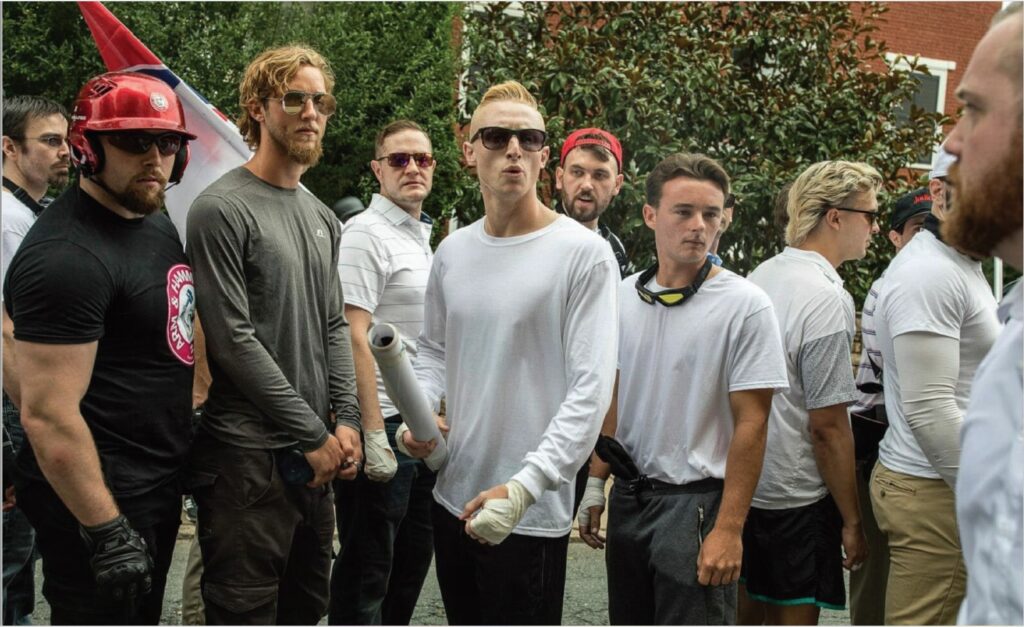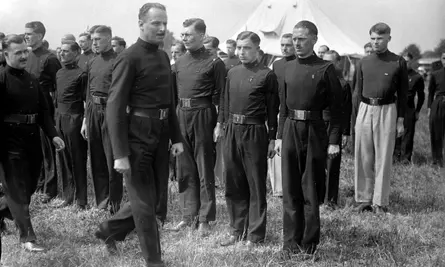Given their fixation on a very particular conception of “tradition,” it should come as no surprise that participants in the alt-right and other closely related movements have regularly adopted language that connects them with figures from the past whose personal mythologies appear useful for their movements’ ends. One manifestation of that is in the very names that participants choose when they want to obscure or alter their identities.
Reanimating “Classical” Fascism
The person who is probably most responsible for organizing and coordinating the events that took place in Charlottesville on August 11-12, 2017 became known to the general public as Eli Mosley (sometimes spelled Mosely), a leading figure in Identity Evropa (IE) who briefly ran the organization in the months after Unite the Right. His legal name is Elliott Kline, but he chose to borrow an alias from Oswald Mosley, the late British Union of Fascists leader. In a 2018 New York Times video report, Kline stated that “I never really kinda got anything when I was Elliott Kline until I became Eli Mosley. Eli Mosley was able to find that sense of purpose that I was always looking for.” It was a telling comment, particularly for a leading figure in a movement that continuously put identity front and center.

Four decades after his death, Oswald Mosley remains a revered figure among international neo-Nazi and neo-fascist activists and intellectuals. This is partly due to his steadfast support for the Nazi regime during World War II (he was, in fact, married in Josef Goebbels’ home with Adolf Hitler in attendance), but also because his postwar activities were focused on establishing a pan-European fascist alliance. Despite the fractious and internally competitive nature of fascist ideology, the dream of welding together a homogeneous, worldwide “white” nationalist movement (by whichever definition of whiteness a particular group of ideologues has chosen) remains a guiding ambition in the twenty-first century. The obvious contradiction – that a movement that constantly bemoans a homogenizing, culture-destroying “globalism” would simultaneously want to amalgamate people who claim Irish, Croatian, Finnish, Swiss, or Portuguese roots while erasing any nuance or cultural specificity – is seldom discussed directly.
During the Sines trial, the plaintiffs’ attorneys played a video recording of a deposition by Samantha Froelich. Froelich was in a relationship with Kline for much of 2017 and, like him, took on a leading role in IE, becoming both the interview coordinator for applicants and the women’s coordinator. (Froelich has since left the white nationalist movement and now works with Life After Hate, an organization created to help people leave far right movements.) In her testimony, she said that she set up an account on the online gaming platform Discord as part of the process of becoming an IE member. The name she used was Norah Fox, a handle she says was chosen by Kline. Like Kline’s own pseudonym, hers was also a historical citation referring, in this case to a British suffragist known to the public as Norah Dacre Fox during the first two decades of the twentieth century. In Froelich’s words, “they called her a fascist feminist. She was a follower of Oswald Mosley’s. She believed that women should still have the right to vote because they are inherently more conservative and even more extreme in their ideology [than men].”

When Froelich joined IE, she was interviewed by a man named Patrick Casey. Casey would later become the organization’s leader before attempting to rebrand it as American Identitarian Movement in March 2019 and ultimately dissolving it in November 2020. When he was interviewing applicants in 2016, he was going by the name Reinhard Wolff, a name he had also been using while publishing reports with the transatlantic white nationalist media outlet Red Ice. To my knowledge, there is no single fascist historical figure named Reinhard Wolff, but it is nonetheless a name layered with historical meaning for white nationalist activists. It conjures both the infamous SS officer and leading architect of the “Final Solution” Reinhard Heydrich, sometimes called “the Butcher of Prague,” as well as any number of wolf-themed names for places or programs under the Nazi regime, including Hitler’s bunkers Wolfsschanze (Wolf’s Lair) and Wolfsschlucht (Wolf’s Canyon), Joseph Goebbels’ failed attempt to establish a popular terrorist organization under his Werewolf program, or the fact that the composer Richard Wagner’s grandchildren, through their parents’ personal friendship with Hitler, grew up calling the future Fuhrer “Uncle Wolf.” The Wolfsangle remains a widely recognized neo-Nazi symbol and wolf and werewolf imagery are still popular in the movement today.
With respect to their links to a mythologized past, the pseudonyms that Kline, Froelich, and Casey used were hardly outliers among Unite the Right organizers and participants. Other activists in the Discord chats leading up to August 2017 adopted handles like Furor_Tuetonicus, a misspelling of the Latin phrase furor teutonicus, or “Teutonic fury,” coined in the first century CE to describe the fighting style the Roman Empire was confronted with as it attempted to expand into northern Europe. (As a pseudonym, of course, the phrase has an added bonus in that it includes an approximate English homophone for the German word Führer.) Another Discord participant simply named himself Léon Degrelle after the Belgian nationalist politician-turned-volunteer with the Waffen-SS. After the war ended, Degrelle lived in exile in Spain for almost 50 years and remained an active neo-Nazi.
Grandiose Mythologies
If jargon borrowed from the fascist or Nazi past helps give contemporary white nationalists a sense of continuity with their (real or perceived) historical antecedents, adopting a name that invokes those predecessors marks a distinctly personal investment: of all the words we use day to day, none are more intimately bound to a sense of self than our own names. In some cases, neo-fascist ideologues who adopt new names almost appear to construct whole personalities that they feel will validate the stature of they name they have chosen.
Among the prominent figures on the North American far-right spectrum in recent years, few have taken on a new name more laden with self-mythologizing freight than defaulted Sines defendant Augustus Sol Invictus. Born Austin Gillespie, he legally changed his name in 2006 to a Latin phrase meaning “majestic unconquered sun.” Invictus’ ideology is somewhat muddled, but he has certainly shown himself to be at the very least comfortable working with Nazi ideas and ideologues, such as when he, as an attorney, defended neo-Nazi Marcus Faella in court in 2012 or when he wrote a pro-eugenics paper while he was in law school with a title, “Future or Ruin,” borrowed from the name of a speech Hitler gave in 1921.
In 2013, Invictus mass emailed a “departure memo” in which he described himself as “of genius intellect & cultured, well-educated & creative, well-mannered & refined. I am God’s gift to humankind where the English language is concerned.” He claimed that “I have prophesied for years that I was born for a Great War” and of his “departure” he wrote “I shall disappear into the Wilderness. I will return bearing Revolution, or I will not return at all.”
The origins of Invictus’ particular godly delusions are unclear, but under the circumstances, it is not at all unreasonable to suspect that his adopted name may have been at least partly inspired by esoteric Nazi mythology concerning the “Black Sun” (for a thorough examination of Nazi occultism, see: Nicholas Goodrick-Clarke, Black Sun: Aryan Cults, Esoteric Nazism and the Politics of Identity, NYU Press, 2002). His grandiose sensibility is certainly consistent with the ideas of mystics like Savitri Devi, whose work is still widely read among neo-Nazis some forty years after her death and who characterized Hitler as an avatar of the Hindu god Vishnu.
In the past few years, Invictus’ domain has frequently been limited to a prison cell, as he has faced multiple charges of domestic violence.
Conclusion
While using an alias can be a matter of security in radical organizing of various stripes, adopting a new name also creates an opportunity for personal reinvention. In the case of “Eli Mosley,” for one example, not only did his pseudonym help him “find that sense of purpose that [he] was always looking for,” it also seems to have created an opening for him to invent an entire backstory: the New York Times report cited above also exposed his purported military career, including in Iraqi war zones, as a sham. (He had, in fact, served in the National Guard, but never traveled beyond the Pennsylvania state line in that capacity.) Kline’s rise and fall were particularly spectacular, but his personal reinvention was not so unusual within the broader movement he was part of.
The story of the alt-right era is, in part, one of consequence-free internet anonymity – and the attendant freedom to allow one’s most absurd and paranoid fantasies to reach full bloom – bursting out of chat rooms and into the three-dimensional world with violent, sometimes deadly results. Unite the Right was not the only flashpoint in that transition, but it has emerged as its most enduring symbol. And while the alt-right effectively collapsed shortly thereafter, its ideas have only become more firmly anchored in popular discourse and its successor movements are all the more entrenched than it ever was. One through-line that connects an array of far-flung sites of contention over the past decade or so – from GamerGate to the incel movement to murderous outbursts in Oslo, Christchurch, El Paso, and elsewhere – is the continuously repeated, gradually morphing language of victimhood and power that constantly reaffirms a violent, misanthropic worldview. There are many fronts on which white nationalist and neo-fascist ideologies can and should be fought, but language – be it at the level of individual words, images, or narratives – is one that is both crucial and often overlooked. It should be given serious, ongoing consideration.

